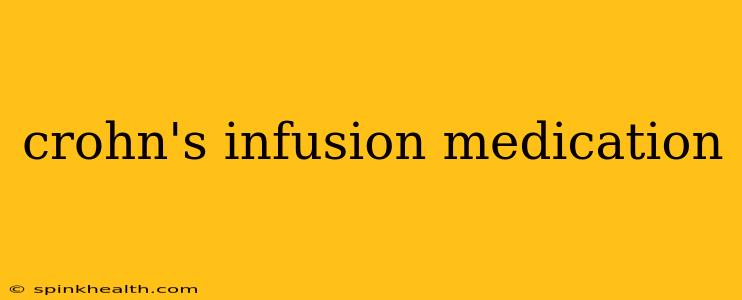Crohn's disease, a chronic inflammatory bowel disease (IBD), can significantly impact a person's life. When medication like pills isn't enough to manage the symptoms, infusion therapy can offer a powerful alternative. This journey into the world of Crohn's infusion medication will explore the various options available, how they work, and what you need to know. Think of this as your comprehensive guide, navigating the complexities of this treatment approach.
Imagine this: Sarah, a vibrant 30-year-old, struggled for years with Crohn's disease. Oral medications provided minimal relief, and her life was consumed by debilitating pain, fatigue, and frequent hospitalizations. Then, her gastroenterologist introduced her to infusion therapy. Sarah's story, though fictional, reflects the reality for many Crohn's patients who find relief through this method.
What Types of Infusion Medications are Used for Crohn's Disease?
Several biologic medications are commonly administered via infusion for Crohn's disease. These medications target specific parts of the immune system believed to be involved in the inflammatory process. They don't cure Crohn's, but they can significantly reduce inflammation and improve symptoms. Let's explore some examples:
-
Infliximab (Remicade): This was one of the first biologic medications used to treat Crohn's and remains a mainstay of therapy. Infliximab works by blocking a protein called tumor necrosis factor (TNF), a key player in inflammation.
-
Adalimumab (Humira): Another TNF inhibitor, adalimumab, is often preferred for its convenience as it can be self-administered via injection. However, it's also available as an infusion, particularly beneficial for patients with certain conditions or preferences.
-
Golimumab (Simponi): Similar to infliximab and adalimumab, golimumab targets TNF. The method of administration and specific suitability vary based on individual patient factors and physician recommendations.
-
Ustekinumab (Stelara): This medication targets a different protein, interleukin-12 (IL-12) and interleukin-23 (IL-23), which are also involved in the inflammatory response in Crohn's disease.
-
Vedolizumab (Entyvio): This drug works by targeting integrins, molecules that help immune cells move into the gut. By blocking these molecules, vedolizumab reduces inflammation specifically in the gut.
How Often are Crohn's Infusion Treatments Administered?
The frequency of Crohn's infusion treatments varies depending on the medication used, the severity of the disease, and the individual patient's response. Initially, infusions may be given more frequently, such as every 2-8 weeks. Once the disease is well controlled, the infusions might be spaced out further. Your doctor will carefully monitor your progress and adjust the treatment schedule accordingly.
What are the Side Effects of Crohn's Infusion Medications?
Like all medications, Crohn's infusion therapies can have side effects. These can range from mild (like headache or fatigue) to more serious (like infections or allergic reactions). Common side effects include:
- Infections: Biologics suppress the immune system, making patients more susceptible to infections.
- Injection site reactions: Inflammation or pain at the infusion site are possible.
- Fatigue: Tiredness is a common side effect.
- Headache: Many patients experience headaches.
It is crucial to discuss any potential side effects with your doctor before starting treatment. They can help manage these side effects and minimize their impact.
What is the Difference Between Infusion and Injection for Crohn's Treatment?
While both infusions and injections deliver biologic medications, the key difference lies in the method of administration and the volume of medication. Infusions are administered through an intravenous (IV) line, delivering a larger volume of medication over a longer period. Injections, on the other hand, deliver a smaller volume of medication directly into the muscle or subcutaneous tissue. The choice between infusion and injection depends on several factors, including the specific medication and the individual patient's needs.
Are there Alternatives to Infusion Therapy for Crohn's Disease?
Yes! While infusion therapy is a powerful treatment option, it's not the only one. Other treatment approaches include:
- Oral Medications: Many oral medications can effectively manage Crohn's disease, especially in milder cases.
- Surgery: In severe cases, surgery might be necessary to remove damaged sections of the bowel.
- Dietary Changes: Specific diets, like the low-FODMAP diet, can help manage symptoms for some patients.
Ultimately, the best course of treatment will be determined by your doctor based on your individual circumstances.
Conclusion: Navigating the Path to Better Health
Sarah's journey, though fictional, highlights the potential benefits of Crohn's infusion medication. With careful monitoring and management, infusion therapy can offer a significant improvement in quality of life for many individuals living with this challenging condition. Remember, open communication with your healthcare provider is key. They can help you understand the options available, weigh the risks and benefits, and develop a personalized treatment plan that addresses your specific needs.

